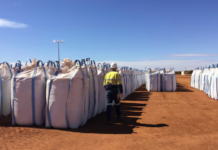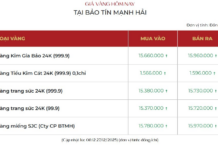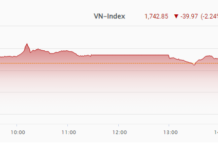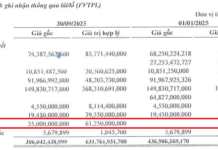The Real Estate Business Law (amended) includes additional provisions that prohibit the transfer of land use rights to individuals for self-construction of houses in special urban areas I, II, and III. This regulation is expected to prevent land parceling (one of the causes of virtual fever and speculation in real estate) in most urban areas.
Article 48 of this law also requires real estate transactions to be made through banks. This move is expected to eliminate the phenomenon of “dual pricing,” which is the basis for building a data system, promoting a more transparent real estate market, reducing speculation, and price hikes.
In addition, Article 153 of the Land Law 2024 stipulates additional revenue items from land, in which land use fees and land taxes will increase for slow-paced or unused real estate projects. The new law is expected to have a strong impact on project implementation and restrict the hoarding of land by organizations and individuals, impeding the access to land for other investors with the same or better capacity to carry out their projects.
This new law also tightens the conditions for enterprises to obtain land use rights for commercial housing projects. Accordingly, only enterprises that have available land funds and have a minimum of 1 square meter of new residential land can be allowed to proceed with the project (the current law allows enterprises to agree to receive, transfer, lease, and contribute capital to land use rights, regardless of the type of land, as long as it is suitable for planning and land use requirements). This regulation helps prevent the situation where enterprises accumulate agricultural land but leave it unused, without implementing any projects or changing the purpose of the land excessively.
Furthermore, in the explanatory report revising the Land Law 2024, the National Assembly Standing Committee also proposed that the Government urgently propose regulations on higher taxes for individuals using large areas of land, owning multiple houses, or speculating in land. This regulation is considered to prevent the hoarding of land by organizations and individuals, thus avoiding wastage of land resources.

Real estate, apartments, skyscrapers… along Hanoi Highway and Metro Line 1, February 2023. Photo: Quynh Tran |
According to experts, the new provisions are gradually addressing the negative aspects of speculation and wastage of land resources that have existed over time.
Nguyen Manh Ha, Deputy Chairman of the Vietnam Real Estate Association, analyzed that the provision that does not allow projects to be divided and land parcels to be sold requires investors to construct crude buildings for buyers. Enterprises will focus on the segment of investing in housing and infrastructure rather than just investing in infrastructure and “selling immature crops.”
“In this way, the value of land plots will increase due to the construction costs. This measure helps save land resources, limit land speculation, slow land use, and prevent abandoned land,” he said.
Meanwhile, Master Nguyen Van Dinh believes that the new law has a provision that obliges commercial and service sector enterprises to rent land and pay annual fees instead of transferring land use rights. They are only allowed to buy or lease assets attached to land. Therefore, users have to put the land into project implementation, making land profitable. This will restrict the situation where enterprises accumulate land to speculate and profit from it without implementing any projects.
According to him, the Land Law 2024 requires land for commercial housing projects. This limits the situation where enterprises “grab land with empty hands.” Only the enterprises with real capacity can access land funds and create a comprehensive, professional, and transparent real estate supply, solving the issue of wastage of land resources.
Similarly, Tran Thi Cam Tu, General Director of EximRS Real Estate Company, believes that the provision requiring a minimum of 1 square meter of residential land for commercial housing projects will filter out investors and prevent hoarding, land accumulation, and non-performance of projects. This measure also enables the state budget to exploit the difference in value when allowing people to change land use purposes or auction clean land.
However, Tu believes that this will create difficulties for enterprises that do not have existing land funds. Therefore, it is necessary for the Government to create conditions for providing clean land funds to businesses participating in auctions and implementing projects. Having clean land funds will shorten the investment period for businesses. The state also needs to support cutting administrative procedures and processes to develop suitable land funds, build technical infrastructure, and attract businesses to develop projects.
According to the leader of a real estate company in Ho Chi Minh City, in addition to the current regulations, it is also necessary to speed up the implementation of property taxes for individuals who own a large number of houses and land to limit land speculation. According to him, this tax should not be imposed on low-income individuals but should be applied to those who speculate and hoard a large amount of land. Therefore, the tax rate needs to be carefully studied to ensure that the purpose of limiting land speculation is achieved. To do this, it is necessary to build a comprehensive land and property data system between localities to manage cases where one person owns land in different localities nationwide.
Nguyen Tieu





































